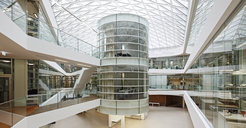About us
Fundamental research for healthy ageing
We are one of the world's leading ageing research institutes. Our mission is to understand the natural ageing process and how we can intervene to mitigate or even prevent age-related diseases.
Since our “birthday” on 28 June 2007, our scientists have been dedicated to unravelling the mystery of ageing: Why do organisms age at all? How can we influence our ageing and longevity? And how can we ensure that our bodies stay fit and healthy as we age? They use model organisms such as nematodes, fruit flies and mice, as well as samples from patients in the clinic and conduct studies on long-lived families. Experimental work at the institute takes place in an interdisciplinary environment and is supported by several Core Facilities.
Bridging the gap between basic and clinical research
Our aim is to link our basic research findings to the causes and processes of age-related diseases that affect a growing proportion of people in our ageing society. Researchers with clinical backgrounds at our institute, as well as collaborations with local university hospitals, enable us to bridge basic and clinical research, establish and share joint facilities, and promote translation for the benefit of our society.
Collaborative research activities
We are an integral part of a local network focused on ageing research, consisting of the Max Planck Institute for Metabolism Research, the CECAD Cluster of Excellence at the University of Cologne, Max Planck Institute for Neurobiology of Behavior and DZNE (German Center for Neurodegenerative Diseases). Our institute is centrally located on the campus of the University of Cologne and the University Hospital Cologne.
Unique building

The building was designed by the award-winning architects Hammes-Krause from Stuttgart, and our researchers moved in in 2014. The unique triangular shape of the inner atrium and the transparent character of the building connect the different laboratories and foster a shared and collaborative spirit. The large, open foyer allows for an open dialogue and exchange of ideas between the scientific community and the public.
The Max Planck Society
The Max Planck Society is the largest non-university research organization in Germany, with currently eighty-six institutes conducting basic research in the natural, human, and social sciences. As an independent, non-profit association of research institutes, it is largely publicly funded by the federal and state governments, with additional funds coming from memberships, donations, project grants, and its own revenues.


